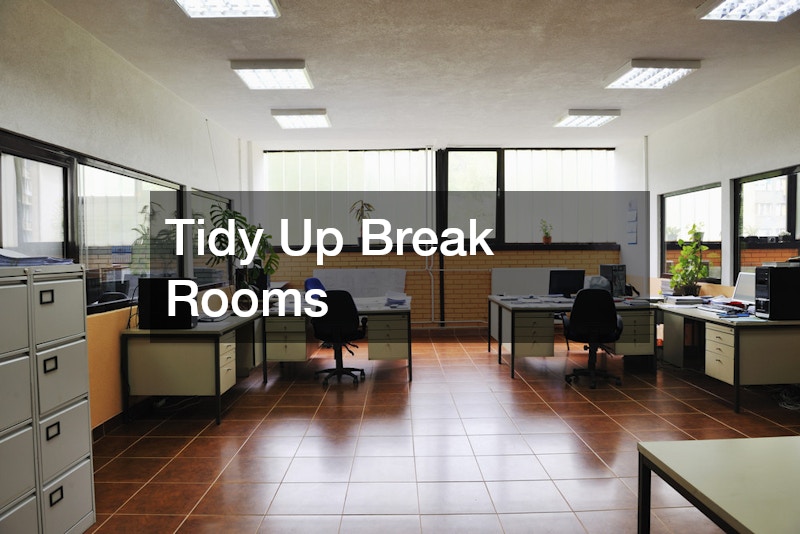Spring is the perfect time to refresh and revitalize not only our homes but also our workplaces. Businesses of all sizes can benefit from a thorough spring cleaning challenge to enhance productivity, improve efficiency, and create a more pleasant work environment. A well-organized and clean workspace can boost employee morale, streamline daily operations, and even lead to cost savings. Whether you run a contract manufacturing company, an auto repair shop, or a fire restoration business, dedicating time to tidying up and optimizing workflows can yield long-term benefits.
This guide will outline ten essential spring cleaning tasks for various types of businesses, ranging from decluttering workspaces to reviewing vendor contracts. By tackling each of these areas systematically, companies can eliminate inefficiencies, enhance organization, and ensure that their operations run smoothly. A cleaner, more organized workspace not only makes daily tasks more manageable but also improves overall workplace safety and professionalism.
Join us in this spring cleaning challenge and take the necessary steps to rejuvenate your business. By following these steps, you will create a work environment that fosters success and efficiency, setting the stage for growth and innovation in the months ahead.
Declutter Workspaces

For contract manufacturing companies, an uncluttered workspace is essential for maintaining efficiency and safety. Spring cleaning provides an opportunity to assess tools, materials, and paperwork that may be taking up unnecessary space. By removing outdated equipment and properly organizing workstations, employees can work more efficiently and minimize distractions.
A clean and organized workspace also enhances workflow by reducing the time spent searching for tools and materials. When everything has a designated place, employees can quickly access what they need, leading to faster production times and fewer errors. This level of organization can also contribute to improved inventory management, ensuring that only necessary materials are stocked and preventing excess waste.
Additionally, decluttering workspaces can significantly impact workplace safety. Cluttered environments increase the risk of tripping hazards, fire hazards, and equipment malfunctions. By systematically clearing out unnecessary items and keeping pathways unobstructed, companies can create a safer work environment and reduce the likelihood of accidents.
Beyond efficiency and safety, a well-maintained workspace fosters a sense of professionalism and morale among employees. When workers operate in a clean and structured environment, they are more likely to take pride in their work and maintain higher levels of productivity. A decluttered space can also enhance collaboration, as employees can move freely and communicate without physical obstructions.
Finally, regular workspace decluttering encourages a culture of continuous improvement. By incorporating organization and cleanliness into daily operations, contract manufacturing companies can ensure long-term sustainability and operational success. Making decluttering a routine practice, rather than a one-time event, helps maintain efficiency and keeps the workplace adaptable to evolving business needs.
Reorganize Storage and Inventory
Auto repair shops rely heavily on having the right tools and parts readily available. A well-organized storage area ensures that mechanics can quickly find what they need without wasting valuable time. Conducting a thorough inventory check, discarding obsolete parts, and reorganizing storage systems can lead to smoother operations and better service for customers.
Implementing a labeling and categorization system can further improve efficiency. Clearly marked shelves, bins, and digital inventory tracking can help mechanics locate parts instantly, reducing downtime and preventing misplaced items. Investing in storage solutions such as modular shelving, pegboards, and tool chests can maximize space and ensure that every item has a designated place, keeping the shop tidy and functional.
Regular inventory audits are also essential for maintaining optimal stock levels. By tracking usage patterns and restocking frequently used parts, an auto repair shop can prevent delays caused by missing or back-ordered components. Additionally, eliminating excess or rarely used inventory frees up space for essential items, reducing overhead costs and improving cash flow.
A well-maintained storage system also enhances workplace safety. Properly storing heavy or hazardous materials, securing loose tools, and keeping walkways clear can prevent accidents and injuries. When everything is in its rightful place, mechanics can focus on their work without unnecessary risks, creating a more productive and secure environment for both employees and customers.
Review and Update Software
For a 24 hour towing company, efficient dispatching and communication are critical. Spring cleaning should include a review of existing software systems to ensure they are up to date and functioning optimally. Upgrading outdated programs or switching to more advanced systems can improve response times and customer satisfaction.
Integrating cloud-based or GPS-enabled dispatching software can further enhance efficiency. These systems provide real-time tracking of tow trucks, allowing dispatchers to assign the closest available unit to a call, reducing wait times for customers. Automated scheduling and digital invoicing features can also streamline operations, minimizing paperwork and administrative burdens for employees.
Regular software updates and cybersecurity checks are equally important. Ensuring that all systems are running on the latest versions protects against potential security threats and reduces the risk of system crashes. Training employees on new software features and best practices can also maximize the benefits of these upgrades, ensuring smoother operations and improved service reliability.
By continuously evaluating and optimizing software solutions, towing companies can stay competitive in an industry where speed and accuracy are essential. Investing in technology not only enhances operational efficiency but also strengthens customer trust by providing prompt and reliable roadside assistance.
Streamline Workflows

A local asphalt paving company can benefit from streamlining workflows to improve efficiency. Evaluating current processes, identifying bottlenecks, and implementing new strategies can lead to quicker project completion times and higher quality work.
One key area to assess is equipment usage and maintenance schedules. Ensuring that machinery is properly maintained and readily available can prevent unexpected breakdowns that cause delays. Standardizing procedures for equipment checks and implementing a preventive maintenance program can keep projects running smoothly and reduce costly downtime.
Improving communication between teams is another essential step in optimizing workflows. Using project management software or mobile communication tools can help crews coordinate more effectively, track progress in real time, and address issues before they become major setbacks. Clear scheduling and task delegation also ensure that every team member knows their responsibilities, minimizing confusion and redundancy.
Finally, analyzing material procurement and logistics can help eliminate inefficiencies. Establishing reliable supplier relationships and optimizing delivery schedules can prevent shortages and delays. By refining these processes, asphalt paving companies can complete projects more efficiently, reduce waste, and enhance customer satisfaction.
Assess Vendor and Supplier Contracts
A metal roofing company should take the opportunity to review contracts with vendors and suppliers. Ensuring that agreements are still beneficial and renegotiating terms if necessary can lead to cost savings and improved service reliability.
Beyond cost considerations, evaluating vendor performance is crucial. Assessing factors such as delivery times, material quality, and customer service can help determine whether a supplier is meeting expectations. If issues such as frequent delays or inconsistent product quality arise, exploring alternative vendors may be necessary to maintain project timelines and uphold high standards.
Establishing long-term partnerships with reliable suppliers can also create opportunities for bulk discounts, priority service, or customized material solutions. Open communication and regular check-ins with vendors can strengthen relationships and ensure that both parties are aligned on expectations and business needs. Additionally, diversifying supplier options can help mitigate risks associated with supply chain disruptions, ensuring a steady flow of materials for ongoing and future projects.
By proactively managing vendor and supplier contracts, metal roofing companies can optimize costs, enhance operational efficiency, and maintain the high-quality standards that customers expect. Regular contract assessments also allow businesses to stay competitive and adapt to market changes more effectively.
Optimize Office Layout
A for flood damage company, an optimized office layout can enhance workflow and employee collaboration. Assessing how desks, equipment, and meeting spaces are arranged can improve overall productivity and efficiency.
A well-structured office layout should prioritize accessibility and functionality. Placing frequently used equipment, such as printers, filing cabinets, and communication hubs, in central locations can reduce unnecessary movement and save time. Additionally, creating designated areas for different teams—such as customer service, field coordination, and administrative support—can improve communication and streamline operations.
Incorporating flexible workspaces can also enhance efficiency. Open-concept areas for team discussions, quiet zones for focused work, and dedicated meeting rooms for client consultations can help employees perform their tasks more effectively. Ergonomic furniture and proper lighting can further contribute to employee comfort, reducing fatigue and increasing productivity.
Regularly evaluating and adjusting the office layout ensures that it continues to meet the company’s evolving needs. As the business grows or workflows change, making strategic modifications can help maintain a productive and organized work environment.
Tidy Up Break Rooms

Paving companies should focus on keeping their break rooms clean and inviting. A well-maintained break room provides employees with a comfortable space to recharge, which can ultimately boost morale and productivity.
Regularly cleaning and organizing the break room ensures that it remains a welcoming environment. Stocking essentials like fresh coffee, snacks, and clean utensils can make the space more enjoyable for employees. Providing ample seating, a microwave, and a refrigerator in good working condition also contributes to a more relaxing and functional break area.
Encouraging employees to take ownership of the space can help maintain cleanliness. Implementing simple guidelines, such as cleaning up after use and rotating responsibility for tidying up, keeps the break room in good condition. A well-kept break area shows employees that their well-being is valued, fostering a positive workplace culture and increasing overall job satisfaction.
Deep Clean Office Areas
A fence company can benefit from deep cleaning office areas, including carpets, windows, and common spaces. A clean and fresh office space creates a positive impression for both employees and clients.
In addition to routine cleaning, focusing on often-overlooked areas such as air vents, light fixtures, and storage spaces can improve air quality and overall hygiene. Decluttering desks and sanitizing high-touch surfaces like doorknobs, keyboards, and shared equipment can help reduce the spread of germs, creating a healthier work environment.
A well-maintained office also contributes to employee productivity and morale. Providing a clean and organized workspace minimizes distractions and fosters a more professional atmosphere. Scheduling regular deep cleaning sessions ensures that the office remains inviting, making both employees and clients feel more comfortable and valued.
Organize Digital Files and Folders
A for fire restoration company, organizing digital files and folders is essential for efficiency. Ensuring that all files are properly categorized and backed up can prevent data loss and improve workflow.
Implementing a standardized naming system and folder structure can make it easier for employees to locate important documents quickly. Utilizing cloud storage or a centralized database ensures that files are accessible from multiple devices, improving collaboration among team members. Regularly archiving old files and removing duplicates can also help maintain a clutter-free digital workspace, enhancing overall productivity.
Clean Out Unused Emails

Phone repair shops should take the time to clean out unused emails and declutter their inboxes. Deleting old, unnecessary messages and organizing important communications can enhance productivity and ensure that critical information is easily accessible.

